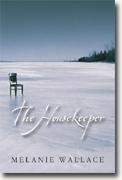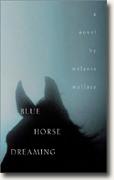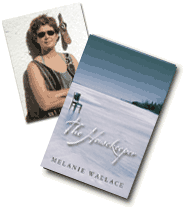An Interview with
Melanie Wallace
Interviewer Luan Gaines: What was your inspiration for The Housekeeper?
Melanie Wallace: Once, many years ago, I came across a boy tied to a tree. That memory became The Housekeeper’s beginning.
I am not an autobiographical writer. While I drew upon the experience of having lived a certain kind of life—rural, poor, directionless—at a certain time, my past was hardly integral to the novel. I did not, for instance (unlike the novel’s main character), untie the boy. Which is to say that after the second page, my story ended and The Housekeeper took on a life of its own, allowing me to write about things vaguely familiar or generally well-known or obsessively imagined: the misery of being rootless or penniless or both, the underlying violence in American life, what occurs when every-man-for-himself becomes the rule rather than the exception, nature’s treacherous beauty, the polarities of innate goodness and unwitting evil, and the complexity of the human heart.
Jamie, a runaway, returns to the only place she has ever visited. What expectations does she have in coming to her grandparents’ former home?
When Jamie, at seventeen, finds herself homeless because of her mother’s death, she takes to the road. She heads for Dyers Corner—with no particular intention to remain there—simply because her memory of it is the only reference point she has in what happens to be, for her, an immense world of unfamiliar places: this is where Jamie’s mother was born, where her grandparents were buried, where her mother once took Jamie to the edge of a reservoir to indicate, guessing as best she could, where her own parents were from. That Jamie remains there is, on one level, a matter of happenstance; on another level, she cannot escape the past’s remarkably powerful pull.
Dyers Corner and the surrounding areas have a bitter history, the past buried beneath a government-engineered reservoir. Does this loss of personal history affect those who remain?
When the continuity of a community’s existence is profoundly disrupted, social history is shattered. Jamie’s family, like others who inhabited the valley that became the reservoir’s basin, lost their homes and their occupations during the Depression; forced to go their separate ways, they and their neighbors lost the solace of shared lives as well as their ability to make a living with what skills they had. Such dislocation has a way of breeding despair, which happens to be a personal affliction of greater or lesser magnitude that, in its most extreme form, blinds the individual to everything but himself. And hardship, that mean test of individual resilience, has a way of introducing, and then reinforcing, distrust of just about anything. The combination tends to disregard—or, in the worst-case scenario, obliterate—social contexts altogether for anyone spawned in its wake. Two generations down the line (and for reasons not exclusive to those above), most characters in The Housekeeper lead emotionally unfulfilled, deeply isolated, balefully lonely lives.
 Why do you use landscape and season to help define your characters?
Why do you use landscape and season to help define your characters?
Nature has the persistent presence of a main character in the novel. In part and at times, it defines who people are because of what they do: Harlan is a poacher, Galen a trapper, and the old hunter—in his youth scarred by a deer, which he interprets as divine punishment—a hermit-like character who obsessively records both the weather and his kills. But for all its harshness, nature also has neutrality: the feral boy who wanders through the wilderness and wreaks havoc in the dead of winter, without remarking or understanding either landscape or season, is shielded (from those searching for him) by both.
Does Jamie release the boy tied to a tree because she is young and has no concept of the consequences, or because it is in her nature to do so?
Jamie, of course, has no idea as to what will happen after she unties the boy; as she later states, she simply thought it wrong that he should be tied to a tree. I’m not sure that notion has anything to do with Jamie’s age, although the act of untying the boy could be interpreted as naive, but Jamie’s nature (she defines herself—and perhaps hides behind this description—as someone things just happen to) leaves her wide open to untying the boy without forethought or, curiously, afterthought.
Rather than an innocent freed from a violent father, the boy is a true product of his environment. As related to the boy, how does Jamie’s act endanger her and others?
By releasing the boy, Jamie unwittingly unleashes a force of evil that has no consciousness of its own malevolence. But the boy is both deadly violent and the eye of the storm: other characters revolve around him as though drawn toward a vortex. Because Jamie and, later, Galen, are suspected by Harlan of harboring the boy, their lives are put in as much jeopardy as the hunter’s, who has taken the boy in without an inkling as to the boy’s destructive nature.
Although inexperienced, Jamie is pragmatic enough to take Damon up on his offer of temporary shelter. What is the dynamic at work in this relationship and how does Jamie justify the risk?
Jamie, like many of my characters, is directed as much by circumstance as character; and, as I’ve mentioned, she defines herself as someone things just happen to. Which means (probably, as characters tend to take on tendencies that confound even the most controlling of authors) that she doesn’t think in terms of risk, or even dynamics: Damon gives her a place to stay, eventually becomes her first lover, but makes her no promises. And so Jamie allows herself no expectations, despite whatever feelings she has. As the relationship plays out, things fall apart. By the time Jamie unties the boy, which becomes point of contention between them, Damon is broke, drinking hard, spending a lot of time with his estranged wife, and Jamie is, in existential terms, as much adrift as when she first left home.
Although older than Jamie by enough years to be her father, Galen provides an island of safety for Jamie, cognizant of his own responsibility in avoiding an inappropriate relationship. How does Galen differ from Damon? What does Jamie find attractive in each man?
Galen is a truly good—and by that I mean ethical— character, and I would hope it difficult not to be attracted to someone whose moral stance is so pronounced. The difference between Galen and Damon isn’t a matter of opposition, but distinction; they are, quite simply, dissimilar. Galen is certainly the more complex character, much more reflective, certainly more reticent. Unlike Damon, he’s in love with Jamie, and he bears that as he would a responsibility.
Jamie must survive the solitary state in which she finds herself after the death of her mother. How does her dog bridge the gap for Jamie and what is its role throughout the novel?
Jamie’s dog is her emotional anchor. The creature is the only thing she can love without qualification, the only creature she knows will love her unqualifiedly in return.
 The Housekeeper, set in 1976, is given a historical context by Margaret, the photographer for whom Jamie works. Why this period, and why the context?
The Housekeeper, set in 1976, is given a historical context by Margaret, the photographer for whom Jamie works. Why this period, and why the context?
Jamie’s world is very different from that into which Margaret was born, not only because of there are generations between them but also because of their very different upbringings; it is left to Margaret to bridge these by reflecting on the reach of history, of politics, even as her photographs provide a framework that reflects how lives were once lived, then changed, in the watershed area. The years from Cuban missile crisis to the end of the Vietnam war were tumultuous in the US; Jamie would not, in 1976, have been an unfamiliar sight on the backroads of a very divided (fissured, a more precise word) country being crisscrossed by hitchhikers—dropouts, or drifters, or runaways—and those who happened to be driving somewhere, anywhere. Incognizant of her own times, Jamie hasn’t the slightest idea of the world beyond her immediate circumstances, and Margaret provides a perspective on that. She is also, as important, an incisive observer of character, and so she casts Galen in a certain light to Jamie as well as sheds what light she can on Jamie.
The postmaster is reminded by Jamie of her grandmother and his unrequited love for her, but he is unable to reach out to the girl. How does this old man’s isolation inhibit his ability to connect to Jamie? Would it have made any difference in the way things turn out?
The postmaster, like Margaret, gives a broader context to the novel, but he does so by ruminating on his personal history—especially his feelings for Jamie’s grandmother—and his own relationship to the reservoir, to its past and present. His loneliness is poignant because Jamie, the physical embodiment of the only woman he ever loved (who was never his), comes into his life toward its end; her presence is a reminder of how painful unrequited love is, and how useless the attempt to relive—and, by so doing, change—the past. His desire to connect with Jamie is, in actuality, an effort to turn back the hands of time, an act of futility.
The Housekeeper is, on one level, a novel about personal displacement, which—perhaps excepting individual madness—is the flotsam and jetsam of social disintegration. Margaret and the postmaster, in small but crucial ways, give a broader sense of this. But their insights cannot, or don’t, change the course of anyone’s life.
In this story of contrasts, in what way does innocence serve as a catalyst for evil? What are you saying about the coexistence of opposites in The Housekeeper?
While Jamie’s act of untying the boy can be read as innocence, evil needs no catalyst, and in The Housekeeper malevolence isn’t the sole province of the feral boy (who simply happens to be the purest embodiment of it): witness Harlan. And while good and evil are (at least as literary tropes) always posed as opposites, I’m not sure they so much coexist—a coexistence implies balance, something there’s not much of in The Housekeeper—or clash, in the sense of doing battle. Rather, good (a rather static force in the novel) holds for what time it can what ground it has, over which evil flows, recedes from, then floods.
The Housekeeper was darker than I expected from the first few pages. Jamie survives, but hardly unscathed. What will Jamie take with her from this frightening experience?
This is the kind of question I always dread, because I’ve no way of answering it intelligently, or intuitively. The novel, which also grapples with the notion of return, ends with Jamie grieving “in the manner of her grandmother, to whom she bore great resemblance.” Beyond the closing of that peculiar curve into a warped circle, I’ve no way of knowing.
Are you working on another novel? If so, can you share something about it with us?
Like many writers, I find it impossible to describe what I am working on. But, yes, there are some written pages; there are many, many others blank.
Do you have any thoughts on writing to share with our readers?
Readers are our reason for writing: without them, we would not be. I can only hope we do them justice.
Melanie Wallace is the author of Blue Horse Dreaming. She and her husband live in Myloi, an agrarian village below the Ohi mountain range in Greece, and in Paris.
Contributing reviewer Luan Gaines interviewed
Melanie Wallace, author of The Housekeeper (see accompanying review), about
her book via email for curledup.com. Luan Gaines/2006.



